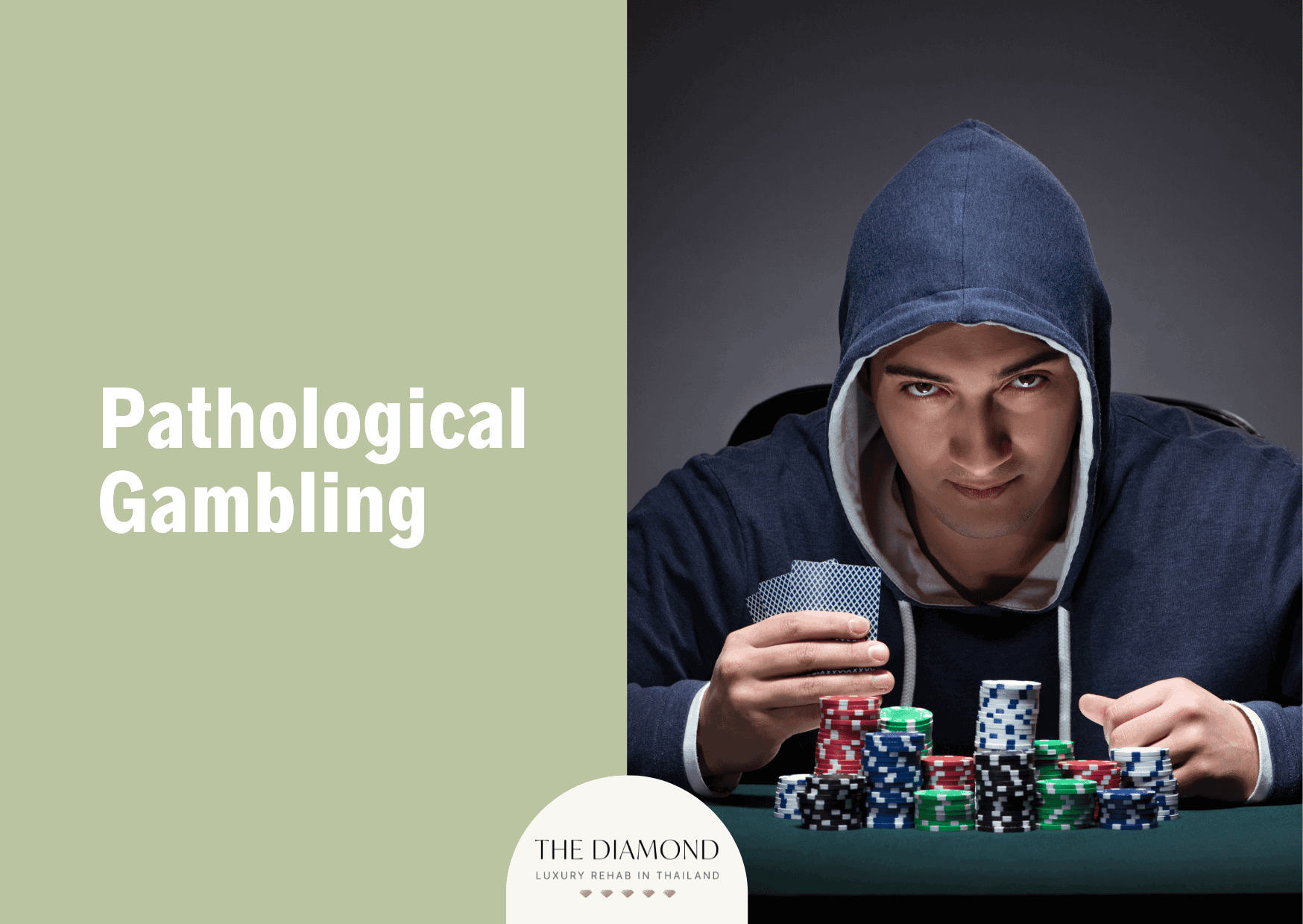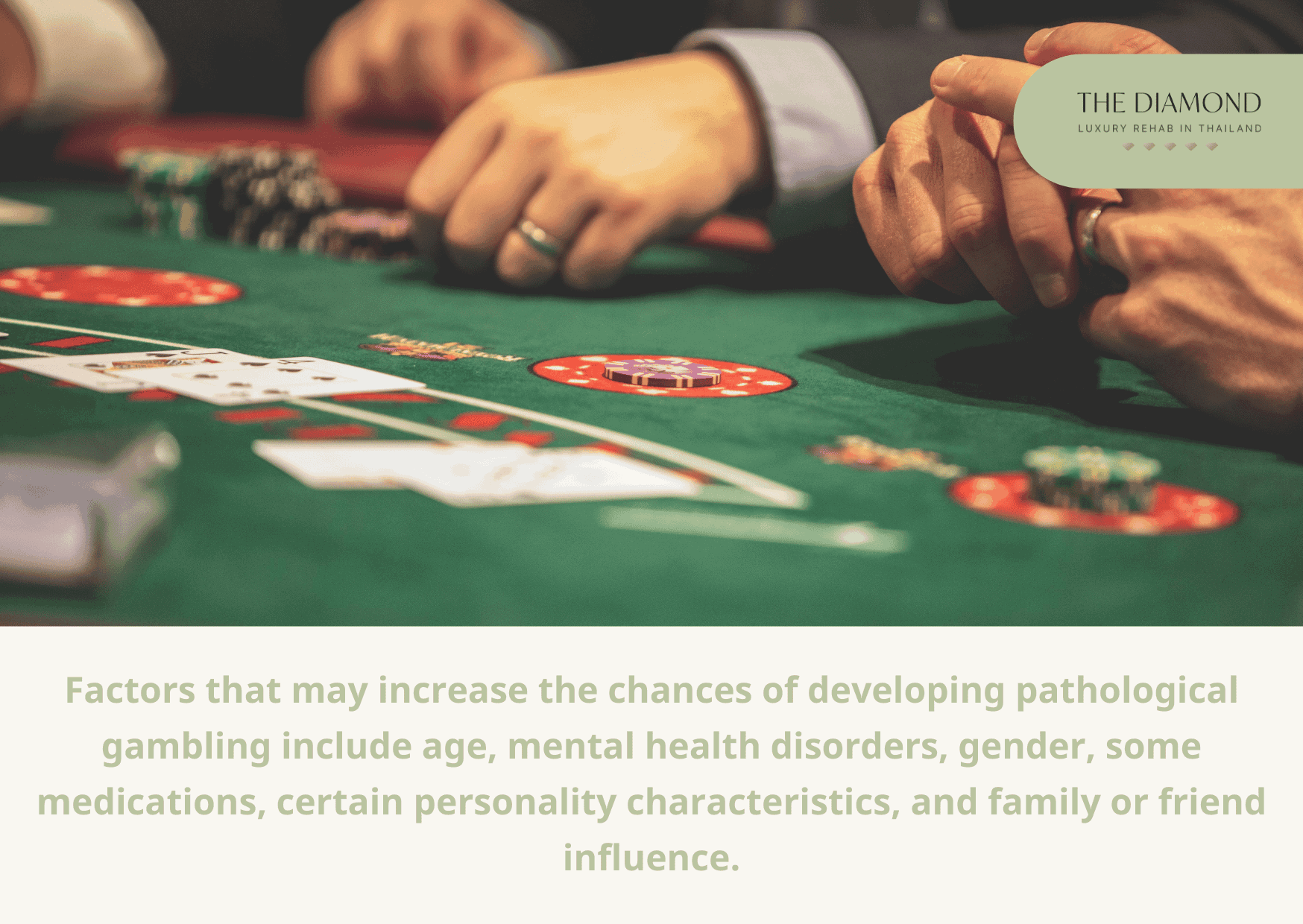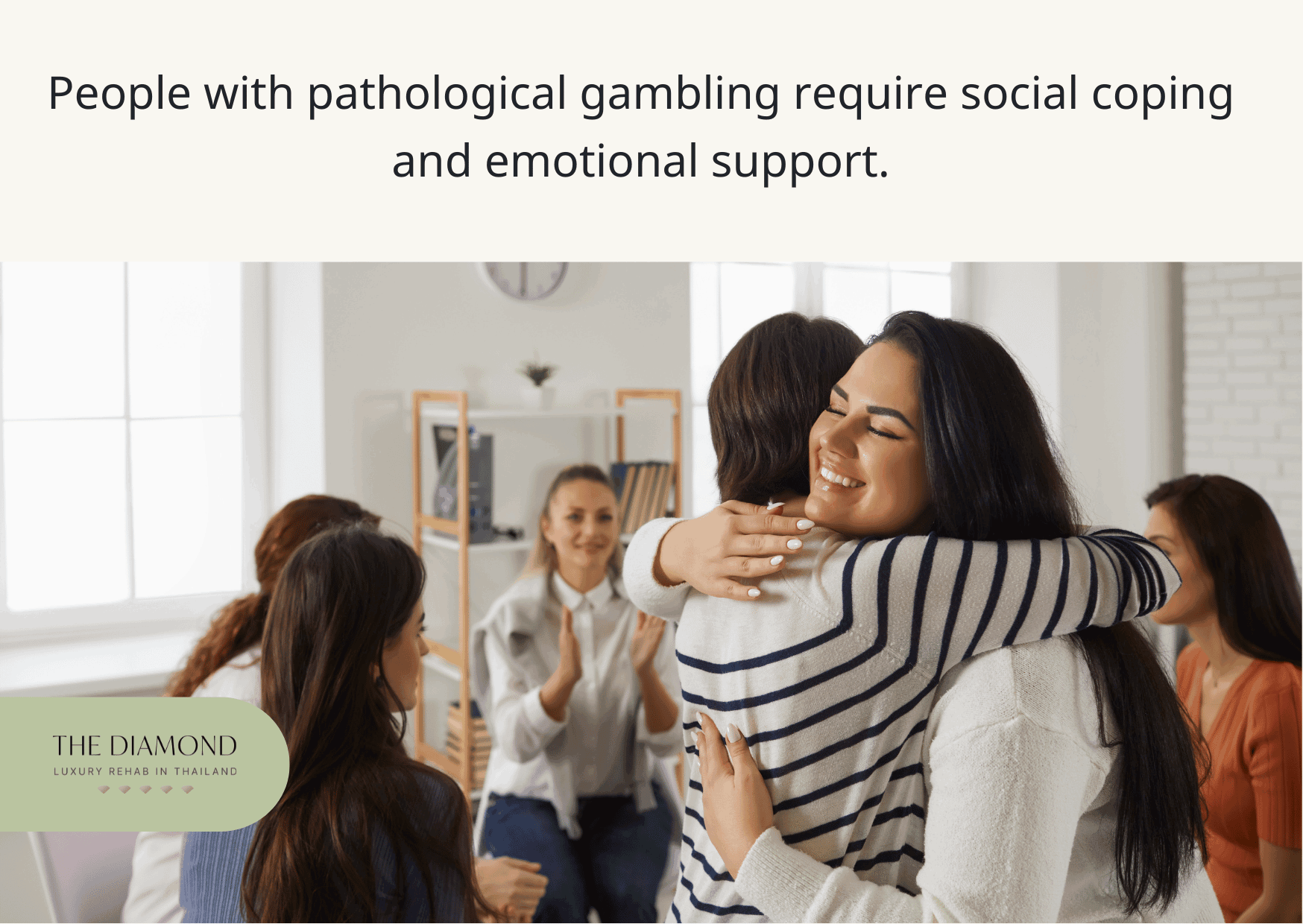Pathological gambling: a gambling disorder
Table of content
- What is pathological gambling?
- What are the causes of pathological gambling?
- When do you need to go to the doctor if you suspect you have pathological gambling?
- What are the factors that may increase your chances of developing pathological gambling?
- What are the possible complications you can suffer when you have pathological gambling?
- What are the preventative measures you should take to avoid developing pathological gambling?
- What are the possible treatments after being diagnosed with pathological gambling?
- What are some of the different types of psychotherapy to help you deal with pathological gambling?
- What medications might you need to help you deal with pathological gambling?
- Do people with pathological gambling require social coping and emotional support?

Pathological gambling, also known as gambling disorder, is the compulsive need to continue gambling despite the problems it causes. The main symptoms of this disorder include being preoccupied with gambling, feeling the thrill and excitement or pleasure when gambling, and unsuccessful attempts to stop gambling.
A person with this disorder also feels irritable or restless when they can’t gamble, or they use gambling to escape other problems in their lives.
Causes of pathological gambling can be biological, psychological, environmental, or social. Risk factors that make a person more prone to gambling disorder include being a male, having a history of mental health disorders or substance abuse, and having a family history of gambling or socializing with people who do.
Pathological gambling has significant effects on a person’s life, and it also affects those around them. Effects of this disorder include financial problems or bankruptcy, legal troubles, and even suicidal thoughts and tendencies. Some people may also aggravate their mental health condition or find gambling harms their physical health too.
Treatment of pathological gambling usually revolves around a combination of therapy, medications, and support groups. The most effective type of therapy for the treatment of this disorder is cognitive-behavioral therapy. Medications usually include antidepressants and mood stabilizers.
Besides standard treatment, a person with a gambling disorder also needs a strong support system at home.
What is pathological gambling?
Pathological gambling is a mental disorder indicated by a compulsive urge to gamble regardless of negative psychological, physical, and social consequences. A 2016 report by Filipa Calado and Mark D. Griffiths from the Journal of Behavioral Addictions reveals that between 0.1% and 5.8% of persons in North America, Europe, Asia, and Oceania met the diagnostic criteria for problem gambling in the year before the survey. In addition, 0.7% to 6.5% of people will at some point in their lives fit the criteria for problem gambling.
Pathological gambling was first recognized as a psychiatric disorder in the United States in 1980 when the American Psychiatric Association’s Diagnostic and Statistical Manual of Mental Disorders Third Volume (DSM-III) was published. Back then, it was considered to be a form of impulse control disorder.
With the publishing of the DSM-V in 2013, the term pathological gambling was changed into gambling disorder. The condition was also reclassified from an “impulse control disorder not elsewhere classified” to one form of substance-related and addictive disorders. The main goal behind these changes was to establish clearer criteria for diagnosis and increase recognition of pathological gambling.
Although pathological gambling was described as a psychiatric disorder in 1980, the roots of this condition have been present throughout history. Gambling itself dates back to the Paleolithic time, i.e., before written history—for example, the earliest six-sided dice date back to around 3000 BC in Mesopotamia.
Ancient Greek books and stories also mention gambling based on tossing coins and throwing dice. While some sources suggest poker began in Greece, others believe it started in Persia or China. In other words, people have gambled since ancient times, and many of them likely had pathological gambling despite the fact that it was only recognized as a psychiatric disorder centuries later.
What are other words for pathological gambling?
Other terms for pathological gambling are disordered gambling, gambling addiction, compulsive gambling, problem gambling or ludomania, and gambling disorder. Degenerate gambling is also another term for this condition, but it is rarely used.
What are the causes of pathological gambling?
The possible causes of pathological gambling aren’t entirely understood, but they could result from biological, genetic, and social or environmental causes. In some cases, a combination of different causes could explain why people gamble.
When a person gambles, their brain releases the neurotransmitter dopamine. This feel-good neurotransmitter also regulates the brain’s reward system. This makes them feel excitement and pleasure. However, excitement doesn’t only happen with wins. The body produces the same neurological response even when a person loses. At that point, they feel like they need to gamble more in order to compensate for the losses they had.
Repeated exposure to gambling decreases the expression and sensitivity of dopamine receptors. That means a person needs to gamble more in order to achieve the same level of excitement and pleasure. Eventually, this leads to problem gambling and paves the way to gambling disorder.
According to DSM-5, pathological gambling isn’t better explained by a manic episode. That means gambling disorders could stem from other causes and is not always a sign of mania.
Sometimes there is no specific cause of pathological gambling, but in some cases, there is. For example, people who are taking medications that treat restless leg syndrome and Parkinson’s disease can develop impulse control disorders, including signs of gambling addiction. This happens due to heightened dopamine activity in the brain and could explain why gambling is addictive.
Another case when pathological gambling may have a single cause is bipolar disorder. The compulsive urge to gamble could be linked to mania. But, as mentioned above, pathological gambling is diagnosed when the symptoms aren’t entirely explained by a manic episode. A lot more research is necessary to learn why gambling is so addictive.
When do you need to go to the doctor if you suspect you have pathological gambling?
The best time to go to the doctor, if you suspect you have pathological gambling, is when friends, family, or coworkers express concerns about your gambling. At first, people deny the existence of a problem and get mad at those who bring it up.
However, it’s important to listen to the concerns of other people. If they express their worries about your behavior and gambling habits, it’s wise to listen to them and see a healthcare professional.
Additionally, people who recognize signs of a gambling problem should see a doctor. Ignoring the signs of the problem is not the best decision because symptoms can aggravate and increase the risk of complications.
In what circumstances do you need to see a doctor right away?
You need to see a doctor right away if you have suicidal tendencies and feel the urge to steal money or engage in other risky activities in order to gamble. Emergencies are unpredictable and may vary from one person to another. Experiencing symptoms that put one’s life at risk in any way is a good reason to see a healthcare professional immediately.
What are the factors that may increase your chances of developing pathological gambling?
Factors that may increase the chances of developing pathological gambling include age, mental health disorders, gender, some medications, certain personality characteristics, and family or friend influence.
More precisely, younger and middle-aged adults are more likely to develop pathological gambling. Engaging in gambling in childhood or adolescence increases the risk of developing this disorder in adulthood.
The presence of other mental health disorders also puts a person at a higher risk of developing signs of gambling addiction. These problems range from substance use disorders, depression, and anxiety to personality disorders. A 2022 article on compulsive gambling from Mayo Clinic confirms that bipolar disorder, ADHD, and OCD can also increase one’s risk of developing pathological gambling.
Dopamine agonists medications can also increase the likelihood of developing gambling disorder as well as some personality characteristics. Being a competitive, workaholic, restless, impulsive, or easily bored person puts you at a higher risk of developing this disorder.
People are also more likely to develop pathologic gambling if they have no interest, hobbies, or direction in life. Having a friend or parent with a history of gambling also increases the chance of developing this condition.

Are men at the highest risk of getting pathological gambling?
Men are at the highest risk of getting pathological gambling. According to a 2013 paper by Wong et al., from the Journal of Gambling Studies, men are more likely to engage in gambling than women. The difference in terms of developing a gambling problem is significant between the two genders. Around 20.1% of male gamblers develop pathological gambling, whereas 7.8% of female gamblers do.
It’s not entirely clear why pathological gambling is more common among men. One theory is that gambling is a social activity and adult males tend to have higher levels of social anxiety. Social anxiety could be the reason adult men are more likely to be involved in gambling.
Additionally, men are more exposed to gambling. For example, men tend to hang out in sports bars where they watch different games that also feature adverts for betting or casinos. Also, men are more likely to be risk-takers, impulsive, and competitive, all of which are common personality traits that increase the risk of addictive gambling.
What are the possible complications you can suffer when you have pathological gambling?
Complications you can experience when diagnosed with pathological gambling include relationship problems, financial difficulties including bankruptcy, legal problems or imprisonment, and poor general health. Some people with gambling disorder also have problems at work due to poor performance, or they lose their jobs. The most severe complication of pathological gambling is suicidal thoughts or tendencies.
Since complications associated with gambling addictions are serious, it’s necessary to be proactive about this disorder. Acknowledging the problem helps manage it.
What are the preventative measures you should take to avoid developing pathological gambling?
Preventative measures you should take to avoid developing pathological gambling revolve around avoiding gambling in any form. That means it’s important to avoid socializing with people who gamble or going to places where you can gamble. Besides avoiding gambling places, it’s also crucial to block websites that allow people to gamble online.
Getting educated about the dangers of gambling disorder is yet another thing a person can do to reduce the risk of developing this condition. Education helps people learn more about warning signs they need to recognize in order to get help before developing a gambling disorder.
Some of the earliest signs of problematic gambling include talking about gambling, bragging about wins, mood swings, problems at work, and spending a lot of money on gambling. Learning to identify these symptoms prevents complications that occur when the disorder is ignored and unmanaged.
What are the possible treatments after being diagnosed with pathological gambling?
Possible treatments you may encounter after being diagnosed with pathological gambling include therapy, medications, and self-help groups. In most cases, the combination of the three approaches works best.
Unfortunately, many people with gambling addiction don’t seek or get help for their problems. For example, annual statistics from the National Gambling Treatment Service reported that only 3% of problem gamblers in the United Kingdom get help. The same happens in other countries around the globe.
Furthermore, according to a 2020 article titled, “Gambling Addiction: Stats, Symptoms, and Treatment Options” from Psycom, more than 80% of people with gambling addiction symptoms never seek treatment for their disorder, regardless of how serious it is.
Treating pathological gambling can be complex and challenging primarily because most people are reluctant to admit they have a problem. After all, a major component of treating this disorder is acknowledging the existence of a compulsive need to gamble.
There is currently no drug therapy approved by the FDA specifically for the treatment of compulsive gambling. However, problems including bipolar illness, depression, and anxiety frequently accompany compulsive gambling and may respond well to antidepressants and mood stabilizers.
Treatment of pathological gambling is performed in an inpatient or residential and outpatient setting. An inpatient program requires a person to spend a specific period of time (e.g. 60 or 90 days) in a rehab center where they receive therapy and guidance. The outpatient program revolves around regular counseling sessions, but a person doesn’t live in a rehab center.
While residential programs are more suitable for persons with severe addiction, an outpatient setting is ideal for people whose pathological gambling isn’t severe or for those who have completed residential treatment and need more structure and guidance afterward to support their recovery.
One of the most significant aspects of pathological gambling treatment is partaking in support groups. Gamblers Anonymous (GA) and other similar groups are a useful mechanism on the road to recovery. Many people find talking with others about pathological gambling helps, especially when they have the same problem. Support groups allow patients to use their experience to help others and get help from them as well.
What are some of the different types of psychotherapy to help you deal with pathological gambling?
Different types of psychotherapy you might encounter during pathological gambling treatment include cognitive-behavioral therapy (CBT), behavioral therapies, family therapy, and psychodynamic therapy, according to a 2005 paper by Timothy W. Fong, MD, published in the Psychiatry journal. Motivational interviewing (MI) is also helpful for persons with pathological gambling.
Cognitive-behavioral therapy is the most common psychotherapy approach for the treatment of gambling disorders. This type of psychotherapy helps a person identify the attitudes, thoughts, and beliefs that lead to gambling. At the same time, it enables a patient to develop strategies to change the thought process and decision-making in order to overcome their disorder.
In 2009, the American Journal of Psychiatry published a case study by Okuda et al., that confirmed that CBT is an effective therapeutic approach for the treatment of gambling disorder. The subject successfully avoided triggers that were used to propel her gambling behavior.
Evidence confirms CBT works by correcting cognitive distortion, reward processing, decision making, and physical or psychological approaches associated with gambling.
While CBT is the most common and effective psychotherapy for the treatment of pathological gambling, other approaches are also viable. For example, motivational interviewing helps patients work through ambivalence and commit to change. In other words, MI explores patients’ arguments for change in a supportive and empathic manner.
This type of therapy involves two stages. The first stage stresses developing motivation for change, whereas the second stage emphasizes cementing commitment, a 2017 review on treatment modalities for patients with gambling disorder from the Annals of General Psychiatry confirms.
When it comes to behavioral therapies in the treatment of pathological gambling, aversion therapy as well as imaginal desensitization and imaginal relaxation have been explored. Aversion therapy revolves around decreasing the frequency of a behavior by relating gambling to unpleasant or negative stimuli. Imaginal relaxation and desensitization are created to deal with hyperactivation of the arousal state that leads to gambling.
Besides individual therapies, group therapies and family therapies are helpful for persons with this disorder.
What medications might you need to help you deal with pathological gambling?
Medications a healthcare professional may prescribe for the treatment of pathological gambling include mood stabilizers and antidepressants. Some antidepressants can help decrease gambling behavior. In some cases, narcotic antagonists i.e., medications used for the treatment of substance abuse, can also help in recovery from pathological gambling.
More precisely, there is no specific medication for pathological gambling. The doctor prescribes medications based on the symptoms, severity of gambling disorder, and presence of other problems such as mental health disorders or substance abuse.
Do people with pathological gambling require social coping and emotional support?

Yes, people with pathological gambling do require social coping and emotional support. A 2009 study by Nancy M. Petry, Ph.D. and Lindsay M. Weiss published in the American Journal on Addictions confirmed that support plays a significant role in the treatment of pathological gambling.
The study found that people with a lower level of social support at baseline had more severe gambling disorders. In other words, social support influences both the severity of the disorder and treatment outcomes.
Subjects who had a strong support system at the beginning of the study experienced significant improvements in the treatment of gambling disorder. Additionally, the support system is associated with more favorable long-term outcomes.
Support and emotional coping are necessary because the compulsive need to gamble is strong, and an affected person finds it difficult to resist. Sometimes, it may seem like it’s impossible to stop. For that reason, family and friends need to encourage the affected person to get help and stay on the right track without judging them.
It’s important to stay focused on the treatment and seek help. A person with pathological gambling can’t beat the disorder with strong willpower only. They need both a strong support system at home and a treatment program recommended by a professional.

